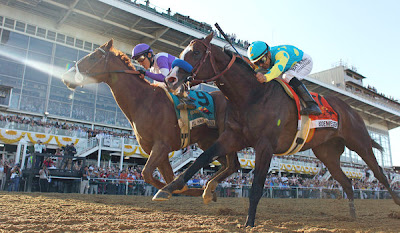 |
| Photo Credit: Allison Joyce/Reuters |
Larry Bird's beginning was humble. They called him the Hick from French Lick after all. He grew up in a poverty stricken family in one of the poorest areas of rural Indiana. His father was an alcoholic, who committed suicide while Larry was in high school. He was an awkward-looking white boy trying to play a sport that had quickly become dominated by more athletic African Americans.
His talent couldn't be denied though, so Bob Knight gave him a chance to come play at Indiana University. Bird quickly became overwhelmed and dropped out of school. He recalled the experience as, "It didn't take me long to realize that I was out of my cocoon." Bird ended up finding a more comfortable place to play, Indiana State. He somehow managed to turn the Sycamores into a national championship contender. This is also where his rivalry with another legend, Earvin "Magic" Johnson, began.
Both went to the NBA, where Bird joined the Boston Celtics and Magic became a Los Angeles Laker. The duo led their respective teams to countless showdowns in what is considered to be one of the greatest rivalries in the history of sports. These are just a few of Bird's accolades he achieved as a player: NBA Rookie of the Year (1980), nine-time All-NBA First Team (1980-88), three-time NBA MVP (1984-86), three-time NBA champion (1981, '84, '86), and elected into the Naismith Memorial Basketball Hall of Fame (1998).
In 1997, Bird agreed to return to his home state and coach the Indiana Pacers. He promised to be on the job no longer than three years, and that is exactly what he did. Despite having no prior coaching experience, Bird led the Pacers to a 58-24 record in his first season and was awarded NBA Coach of the Year honors. His team made it to the conference finals that year and the next. His team the third and final season made it to the NBA Finals, before losing to the Lakers.
In 2003, Bird returned to the Pacers, this time as as team president. The organization appeared to be headed in the right direction, until a franchise-changing brawl in 2004 rocked the franchise. Bird spent the next several seasons gutting his rosters and going through coaching change after coaching change. On the court, the Pacers sputtered along in mediocrity. Bird was forced to take middling (and often criticized) first-round picks like Danny Granger (17th overall), Roy Hibbert (17th), Tyler Hansbrough (13th), and Paul George (10th).
Last season, Bird decided to fire head coach Jim O'Brien midway through the season and put unproven assistant, Frank Vogel in charge. Vogel led the Pacers to the playoffs, and Bird rewarded him with the head coaching gig. While many executives whined and complained during a strike-lengthened offseason, Bird looked to complete his overhaul. Despite only having small-market resources, Bird looked to make moves that would help make his team a contender right away, but also build for the future. In the draft, he acquired George Hill from the San Antonio Spurs for three players. Hill, a local fan favorite, was just the type of point guard Vogel needed to run his offense.
Next, Bird signed the veteran leader he needed in big man David West. West, a former All-Star, was coming off knee surgery, which lowered the asking price. His quiet demeanor and consistent play was exactly what the Pacers needed. Then, he acquired center Louis Amundson from the Golden State Warriors for Brandon Rush. Bird realized the value of having front-court depth and that's exactly what Amundson provided.
Finally, Bird made his trade deadline move with the Toronto Raptors, getting the fiery Brazilian guard Leandro Barbosa for a future second-round pick and cash. Barbosa, a natural scorer, became the perfect compliment for fellow guard Darren Collison off the bench. Since April 1, the completed Pacers team has gone 18-5, including 6-2 in the playoffs.
Speaking of those playoffs, these Pacers just beat the "world-class" Miami Heat tonight for the second time in three days by the resounding mark of 94-75. Their defense has left LeBron James "tired" and Dwayne Wade looking flat out silly. They are two wins from pulling off the supposedly "impossible." Meanwhile, Bird was awarded NBA Executive of the Year.
Bird's response to the honor was, "This is an honor for the Indiana Pacers, not an award for Larry Bird. Everyone in this franchise put in a lot of work and showed a lot of patience as we have tried to get this team to a level on and off the court the fans of Indiana can be proud of. You always believe, and hope, the players you get will fit into a plan, and I'm very proud of what our guys and our coaches have accomplished so far this year."
Larry Bird remains as humble as ever. Despite how others want to lavish him with honors, he wants to thank those around him and please the fans. Bird happens to be the only man ever to be named the league's top coach, executive, and MVP. Not bad for a poor white boy from a little town in the cornfields of Indiana. Bird just keeps continuing his legacy of basketball legend for more and more to marvel at over the years.








